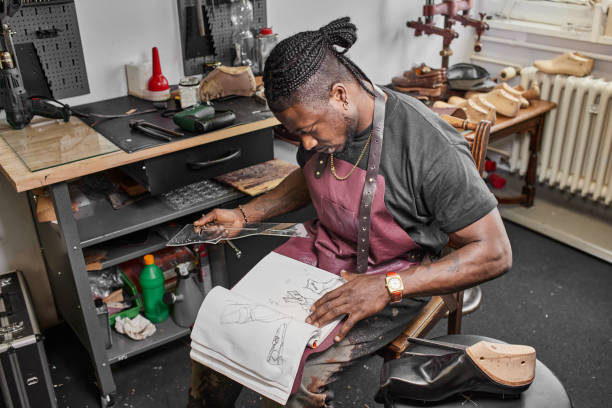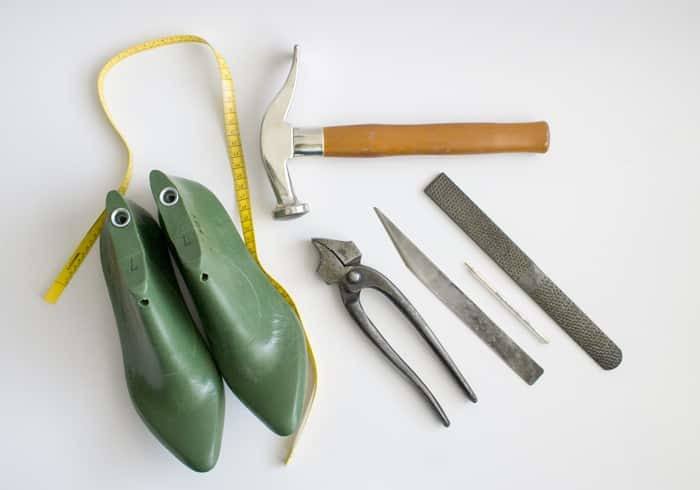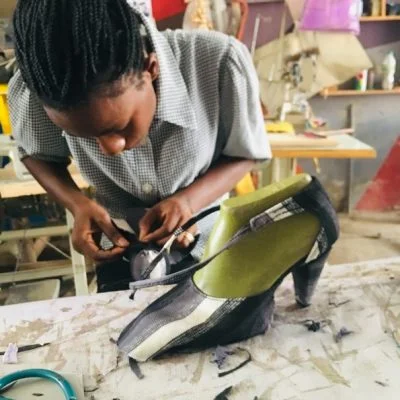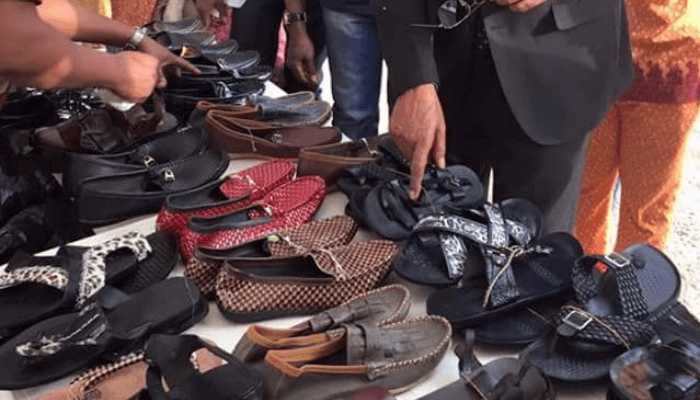Have you ever thought about making your shoes? What if you could turn that passion into a profitable business in Nigeria? The shoe-making business isn’t just about creating something stylish to wear, it’s also a chance to tap into a growing market that’s always on the lookout for unique, high-quality footwear.
Whether you’re dreaming of starting a business from home or opening a shop, the opportunities in this industry are endless. In this guide, we’ll walk you through everything you need to know about how to start a shoe-making business, from learning the craft to selling your creations. Ready to step into this exciting world of shoe-making? Let’s go then!

An Overview About Shoe-making Business in Nigeria
The shoe-making business in Nigeria is growing fast, especially among young people looking to turn their skills into profit. With high demand for stylish, affordable footwear, local shoemakers are creating everything from sandals and slippers to school and corporate shoes.
Places like Aba are well-known for quality handmade shoes, and many people now sell their products through Instagram, WhatsApp, and e-commerce sites like Jumia. It’s a business that doesn’t need much capital to start, and training is easy to find through online videos or local apprenticeships.
Despite challenges like poor power supply, limited access to quality materials, and competition from imported shoes, the future of shoemaking in Nigeria looks bright. More youths are turning it into a serious hustle, employing others and even exporting their products.
With social media, government support, and creative branding, small workshops can grow into big brands, making shoemaking one of the most promising small-scale businesses in Nigeria today.
Related Posts:
- How to Launch a Delivery Business in Nigeria
- How to Start and Run a Barbing Salon in Nigeria
- How Much to Start a Laundry and Dry Cleaning Business in Nigeria
- How to Make Money Fixing Mobile Phones in Nigeria
Skills and Expertise Required
Before diving into the business, you need to learn the essential skills of shoe-making. But don’t worry, this isn’t something you need to be born with. With dedication and practice, anyone can master it!
Shoemaking Skills
Here are the shoe-making skills mostly required for you to the successful in your journey:
1. Dexterity: Shoemaking requires a steady hand and patience. You’ll be cutting, stitching, and shaping leather or fabric, and you’ll need to be precise.
2. Creativity: Whether you’re designing stylish sneakers, formal shoes, or sandals, creativity plays a big role. The better your designs, the more customers you’ll attract!
3. Physical Stamina: Shoemaking is hands-on work. It can be tiring, but with time, you’ll get used to the rhythm of the craft.
Business Skills
1. Financial Management: Understanding how to manage your costs and profits is crucial. You’ll need to budget for materials, labor, and other expenses.
2. Marketing: Building a brand and finding ways to promote your shoes will help set you apart from the competition.
Essential Tools and Equipment Needed
Now that you know the skills, let’s talk about what you’ll need to get started. Here are some basic tools and equipment you’ll require:
1. The Last: This is the mold you use to shape shoes. You’ll need different sizes for different shoe designs.
2. Shoe Hammer and Lasting Pliers: These tools help with assembling and shaping the shoe.
3. Knives and Scissors: For cutting leather and fabric to the right sizes and shapes.
4. Nails, Adhesives, and Sandpaper: These are used to finish and refine your shoes.
If you’re just starting, you don’t need all the fancy machines. Many shoemakers begin with just a few basic tools and gradually expand as the business grows.

How to Make and Sell Shoes Procedure
Here are the different procedures you need to know before embarking on your business:
Cost Estimation and Budgeting
When you start your shoe-making business, one of the first things you need to do is plan your budget. How much will it cost to get things rolling?
1. Startup Costs: For a small-scale operation, you may need between ₦50,000 to ₦100,000 to cover costs like rent, materials, tools, and legal registration.
2. Ongoing Expenses: These include the cost of materials (leather, fabric, thread), labor (if you hire workers), and packaging.
The great thing about the shoe business is that you can start small. You don’t need a huge investment to make great shoes; you can begin by working from home and gradually grow as you make sales.
Choosing Your Business Model
Now, let’s talk about how you’ll run your shoe business. There are several models to choose from:
1. Made-to-order vs. Ready-to-Sell: You can decide to make shoes only when customers place an order, or you can make a batch of shoes in advance and sell them in a store or online.
2. Wholesale or Retail: You can sell directly to customers or collaborate with stores to sell your shoes at a wholesale price.
3. Online vs. Physical Store: You could sell shoes from your store, or you might want to set up an online store. Social media platforms like Instagram and Facebook are also great for promoting your shoes.
Setting Up Your Shoemaking Business
Once you’ve learned the craft and chosen your business model, it’s time to set up shop. Here’s what you need to do:
1. Register Your Business: In Nigeria, you need to register your business and get the necessary permits. This will make you a legitimate business and open the door to more opportunities.
2. Find a Location: Whether you’re working from home or renting a shop, make sure the location is convenient for both production and customers.
3. Create a Brand: Your brand is more than just your logo, it’s the identity of your shoes. Think about what makes your shoes different from others and emphasize that in your branding.
The Production Process
Making shoes is an art, and like any art, it requires patience and attention to detail. Here’s a general idea of how the process works:
1. Material Sourcing: The first step is finding good-quality materials like leather, fabric, and rubber for soles. You can source these locally or from international suppliers and also local markets in the country, places like Aba, Ariaria Market, and Alaba International Market sell shoe materials wholesale and retail. it depends on where closest to your location.
2. Designing & Prototyping: Before making many pairs of shoes, create a prototype. This helps you iron out any issues and perfect your design.
3. Manufacturing: Once your design is finalized, you can start producing the shoes. This involves cutting, stitching, and assembling the parts.
Marketing Your Shoe Business
To sell your shoes, you’ll need to get the word out. Here’s how to market your brand:
1. Branding & Positioning: Make sure your shoes stand out. Whether it’s the quality, design, or comfort, find a way to communicate your unique selling points to create awareness.
2. Social Media: Platforms like Instagram and Facebook are essential for showcasing your shoes. Share photos, stories, and customer testimonials to build your audience.
3. Offline Marketing: Don’t forget about local marketing strategies like flyers, word of mouth, or attending events to show off your shoes.
Sales Channels
Once you’ve made your shoes and marketed them, you need to sell them! Here are some ways to do that:
1. Direct-to-Consumer: Whether online or in-store, selling directly to customers allows you to control your pricing and brand.
2. Wholesale: Partner with retailers to get your shoes in stores across Nigeria.
3. Exporting: As your business grows, consider exporting your shoes to other countries.
Hiring and Managing Employees
As your business grows, you may need extra hands to help with production or sales. When hiring:
1. Look for people who share your passion for the craft.
2. Train them to ensure they understand your business’s quality standards and customer service.
Growing Your Shoemaking Business
Once you’ve gotten the hang of things, it’s time to think about growth. You could:
1. Expand Your Product Range: Introduce new styles or accessories, such as shoe polish or shoe laces.
2. Improve Production: Invest in machines to speed up production while keeping quality high.
3. Scale Your Business: If you’re ready, consider opening additional stores or even franchising your brand. Here is how to open a new business location from your current business.

Challenges and How to Overcome Them
Every business faces challenges, and shoemaking is no different. Let’s look at some common issues and how you can overcome them:
1. Competition: Tips for Differentiating Your Brand
A. Quality: Ensure that your shoes are durable and stylish. High-quality shoes will keep customers coming back.
B. Unique Designs: Stand out from competitors by offering unique designs that no one else is making.
C. Brand Loyalty: Build strong relationships with your customers by providing excellent customer service and engaging with them on social media.
2. Quality Control: Ensuring Your Shoes Are Durable and High-Quality
A. Regularly check the quality of your materials and finished products.
B. Train your team to ensure that every shoe meets the same high standard.
C. Test your shoes for durability, comfort, and fit to ensure they hold up well over time.
3. Finding Reliable Suppliers: How to Source Materials in Nigeria and Internationally
A. Local Suppliers: Look for suppliers of leather, rubber, and other materials within Nigeria to reduce shipping costs as it is stated above that you source for materials in Aba, Lagos and other places in Nigeria.
B. International Suppliers: Explore international sources if you can’t find quality materials locally. Be sure to check the reliability of your suppliers and their delivery times.
C. Networking: Join local and international trade fairs or expos to connect with trusted suppliers or join the Nigerian trade fair.
Financial Tips for Shoemakers
Managing the financial side of your business is crucial to long-term success. Here are some tips to keep your finances in check:
1. Managing Cash Flow: Tracking Expenses and Revenues
A. Track Your Costs: Keep a close eye on the costs of materials, production, and labor. This will help you set the right price for your shoes.
B. Revenue Tracking: Regularly monitor how much money you’re making to ensure your business is growing.
C. Use Accounting Software: Invest in simple accounting software to make it easier to track your finances.
2. Funding Your Business: Exploring Loans, Investors, and Grants for Small Businesses in Nigeria
A. Loans: Look for small business loans from Nigerian banks or microfinance institutions.
B. Investors: If your business has the potential to grow quickly, consider looking for investors who can help fund your expansion.
C. Government Grants: The Nigerian government offers grants and funding for small businesses, so be sure to check for opportunities.

Frequently Ask Questions and Answers
1. How much does it cost to start a shoe-making business?
Starting a small shoe-making business in Nigeria can cost between ₦100,000 to ₦300,000, covering tools, materials, and workspace. You can start small and grow over time, especially if working from home.
2. Do I need formal training to make shoes?
Formal training is not required, though it helps. Many shoemakers learn through apprenticeships, online resources, or practice. Basic skills in design and craftsmanship are important for quality production.
3. Where can I find materials to make shoes?
You can find shoe-making materials at local markets like Oke-Arin and Balogun in Lagos, or Aba. Online and international suppliers are also options for specialized materials.
4. How can I sell my shoes in Nigeria?
You can sell shoes through a physical store, online platforms, or social media (Instagram, Facebook). Partnering with retailers or using platforms like Jumia and Konga can help expand your reach.
Conclusion
Starting a shoe-making business in Nigeria is an exciting opportunity, and with the right tools, skills, and mindset, you can turn your passion into a profitable venture.
The road may not always be smooth, but remember, every step you take brings you closer to your goal and success. Whether you’re making shoes from home or running a shop, the key is to stay consistent, keep learning, and market your shoes well.
So, what are you waiting for? Get started on your shoemaking journey today, you never know where it might take you!
If you found this guide helpful, please consider supporting us by subscribing to our newsletter, liking it, and sharing it with others.


